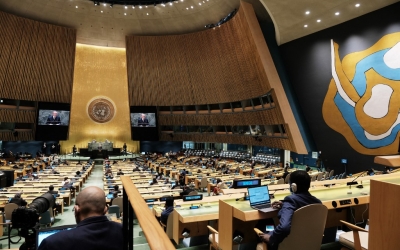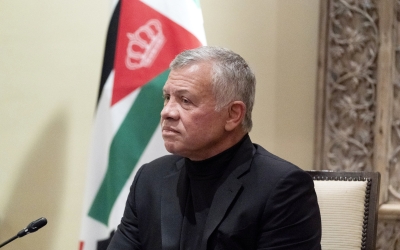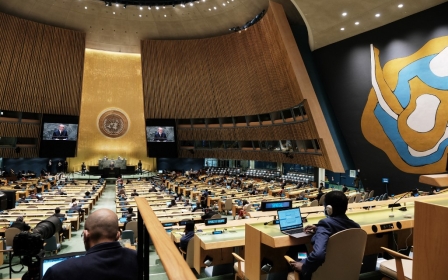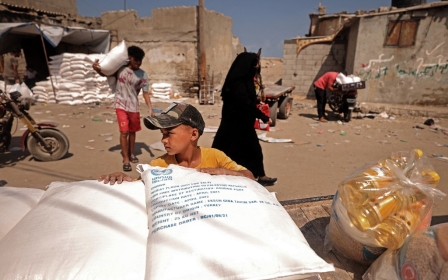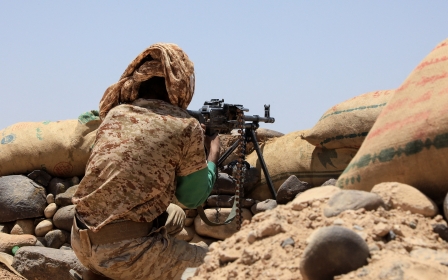Saudi Arabia's King Salman expresses hope for direct talks with Iran in UN speech
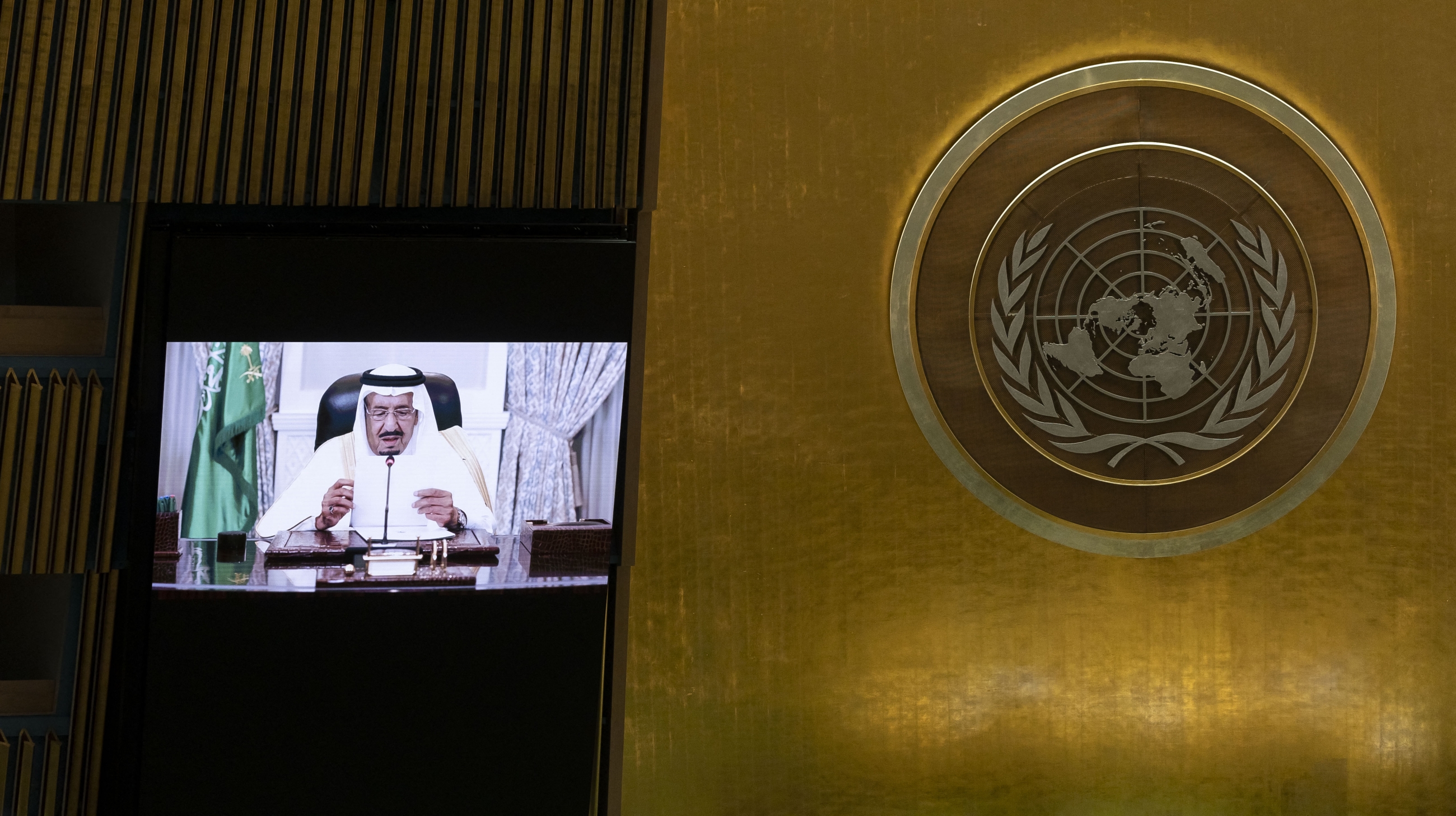
Saudi Arabia's King Salman expressed hope that the kingdom's direct talks with Iran will lead to confidence building, as the two bitter regional rivals take small steps toward dialogue following several years of heightened tensions.
In a pre-recorded message to the United Nations General Assembly on Wednesday, King Salman also said he supported efforts to prevent Iran from obtaining nuclear weapons and expressed concern about Iran's destabilising use of regional proxies.
"We support international efforts aiming at preventing Iran from having nuclear weapons," he said, adding, "We are very concerned about Iranian steps that go counter to its commitments as well as daily declarations from Iran that its nuclear programme is peaceful."
Iran and Saudi Arabia have engaged in proxy conflicts across the region, backing rival sides in countries including Yemen and Syria. They cut diplomatic ties in 2016, but have recently been holding talks in Iraq aimed at reducing tensions.
"Iran is a neighbouring country, and we hope that our initial talks with it will lead to concrete results to build confidence... based on respect of sovereignty and non-interference in internal affairs," King Salman said.
Since intervening in Yemen's war in 2015 to prop up the government of President Abd-Rabbu Mansour Hadi, rights groups say the Saudi-led coalition has repeatedly targeted non-military sites - including schools, factories and hospitals.
At the same time, Houthi rebels, which control large swathes of northern Yemen, have claimed responsibility for ballistic missile and drone attacks that have struck deep into Saudi Arabia and targeted civilian infrastructure.
"The kingdom maintains its legitimate right to defend itself… the peace initiative in Yemen tabled by the kingdom last march ought to end the bloodshed and conflict," King Salman said.
"Unfortunately, the terrorist Houthi militias reject peaceful solutions. They have placed their bets on a military option."
In his address, King Salman reiterated his commitment to the creation of a Palestinian state with East Jerusalem as its capital.
"Peace is the strategic choice of the Middle East region which goes through a just, durable solution to the question of Palestine," he said.
Although he has long been considered a supporter of the Palestinian cause, analysts suggest his young son and the country's de-facto ruler - Crown Prince Mohammed bin Salman - may be open to normalising relations with Israel.
Also in his address, King Salman expressed support for efforts to find a solution to the stand-off over the Grand Ethiopian Renaissance Dam (GERD).
Africa's largest hydroelectric project has been the source of an almost decade-long diplomatic stand-off between Ethiopia and the downstream nations of Egypt and Sudan.
"The kingdom strongly supports efforts to find a binding, peaceful solution to the problem of the Renaissance Damn that protects the rights to water for both Egypt and Sudan," he said.
Jordan
Also at the summit, King Abdullah of Jordan said the status quo in the Israeli-Palestinian conflict was "unsustainable".
King Abdullah said a global partnership was critical to resolving one of the longest-standing conflicts in modern history. "How many more homes will be lost?" he asked. "How many more children [will] die before the world wakes up?"
He reiterated calls for a two-state solution to the conflict. "Genuine security for either side – indeed, for the whole world – can only be achieved through the two-state solution, a solution that leads to the establishment of an independent, sovereign, and viable Palestinian state on the basis of the June 1967 lines, with East Jerusalem as its capital, living side-by-side with Israel in peace and security."
Israeli Prime Minister Naftali Bennett has rejected calls for the formation of a Palestinian state and said last month that he had no intention of entering into negotiations.
King Abdullah also emphasised the Hashemite monarchy's role as custodian of Jerusalem.
Earlier this summer, the monarchy was roiled by a plot that allegedly involved the Saudi royal family taking custodianship over Jerusalem in exchange for normalising relations with Israel.
"Jordan will continue working to preserve the historic and legal status quo of Jerusalem and its Islamic and Christian holy sites under Hashemite custodianship," King Abdullah said.
"I believe Jerusalem's holiness to Muslims, Christians and Jews can and must bring us together," he said. "With international help, the holy city can be, not a cause of division, but a symbol of unity for all to see."
King Abdullah also discussed the situation in neighbouring Lebanon, which is in the midst of a humanitarian and economic catastrophe believed to be among the worst in the world since the 1850s.
"In this time of great need, we owe the Lebanese people our full support to enable them to rise from this crisis," he said.
King Abdullah made a plea similar to other regional leaders who have called for international assistance in handling the Middle East's refugee crisis.
Economically strapped Jordan hosts an estimated 1.3m Syrian refugees along with those from other regional conflicts. "The wellbeing of these millions [of refugees] and the communities that host, that remains an international responsibility," he said.
"The suffering we continue to see points us once more to the critical need to keep supporting UNRWA," King Abdullah said, highlighting the role of the UN's Refugees and Works Agency which provides assistance to 5.7m Palestinian refugees.
Middle East Eye propose une couverture et une analyse indépendantes et incomparables du Moyen-Orient, de l’Afrique du Nord et d’autres régions du monde. Pour en savoir plus sur la reprise de ce contenu et les frais qui s’appliquent, veuillez remplir ce formulaire [en anglais]. Pour en savoir plus sur MEE, cliquez ici [en anglais].


